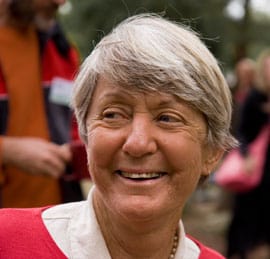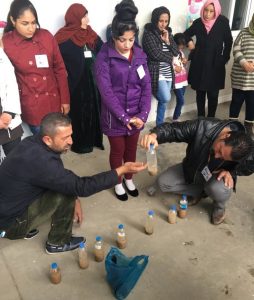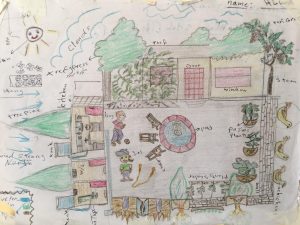Is Quakerism a ‘Religion For Atheists’.
/5 Comments/in 1206 June 2012 /by Mark JohnsonReview of Alain De Botton (2012) Religion for Atheists. London: Hamish Hamilton.
Ian Hughes, New South Wales Regional Meeting.
I have heard interviews on radio and watched interviews on television. I’ve also read reviews in newspapers, and now wonder if Quakerism might be the religion for atheists that De Botton is looking for.
Reading the book, I was left with an impression that De Botton is nostalgic for a bygone age when religion held communities together, enabling whole villages and towns to lead ethical and transcendent lives. It is an easy book to read, with gems of insight and even wisdom.
De Botton claims that, in the West, ‘we have allowed religion to claim as its exclusive domain areas of experience which should rightly belong to all mankind’ (p. 15). He thinks religions have combined theories about ethics and metaphysics with a practical involvement in education, health and other everyday concerns in ways which no secular institution has managed. He proposes a new secular religion of wisdom without doctrine, with secular temples which aim to raise the human spirit, with secular schools and universities which teach morality, not just facts and theories. In short, he proposes a religion without God.
I kept wishing that De Botton had dome some research into existing religions, such as Buddhism, Taoism and Indigenous Australian Religions. I would like him to read Beyond Religion: Ethics for a Whole World and Towards the True Kinship of Faiths, both by the Dalai Lama. He might inquire how Hinduism has many Gods, which some scholars understand as projections of human minds rather than independently existing supernatural beings. De Botton limits his discussion to the Abrahamic Religions, and even here he seems unaware of the acceptance of non-theists in some Jewish and Christian congregations.
Alain De Botton is an atheist brought up by non-observant parents from a Jewish family with a long and proud heritage. He was educated in Anglican boarding schools and at Cambridge University. De Botton writes that ‘for some atheists, one of the most difficult aspects of renouncing religion is having to give up on ecclesiastical art and all the beauty and emotion therein’ (p208). I speculate whether De Botton is worried that a public commitment to atheism means forgoing his Jewish heritage.
This leads me to wonder: ‘Should I tell De Botton about Quakers?’
For more than 300 years many Quakers have not believed in the God described by mainstream Catholics and Protestants. Non-theism is openly discussed and accepted by liberal unprogrammed Meetings in the United States, Britain and Australia. We have the wisdom without doctrine that De Botton seeks, and we bring ethics and transcendence to unity.
But we don’t have some of the other things which De Botton looks for, the sacramental genius of the Mass, the splendour of religious art, the inspiring cathedrals and uplifting music or the Jewish family rituals. Perhaps he would be disappointed by the quiet simplicity of Quaker Worship.
Quakerism may not provide what De Botton is seeking, but my personal hope is that we are and continue to be a religion for atheists.
Links
Click here [http://www.youtube.com/watch?v=2Oe6HUgrRlQ ] for video of Alain de Botton talking about this book. For different opinions about this book visit The Guardian, Huffington Post or New Statesman
5REPLIES















“So what is being Quaker except an encounter?”
Over the last few months, I have found myself asking this same question.
The sense of responding to something either within or without, or to an event, and wanting to respond; to reciprocate; IS the encounter that many Quakers talk about experiencing/seeking to have in Meeting for Worship, though it is an encounter that happens everywhere and anywhere in ones life.
Quakers has historically been seen as and sees itself as a less institutionalised “church” compared to the mainstream/establishment churches/religions. And this is true to a large extent. But there is a longing for a creedal culture and an insecurity for lack of institutional religion among Quakers.
In the UK, Quaker meetings have a high percentage of so called refugees from mainstream institutional religions – Anglicans, Methodists, Baptists, Catholics, Jews, Buddhists. Many of them mourn the loss of the creedal rituals that provided the superstructure and holding of their previous religious communities. In the last 25 – 50 years, British Quakers have transitioned from being largely a “church” born into the faith to being a “church” of convinced adults. This means most of us have developed a relationship to and/or an understanding of the divine, god, religion, etc, independent of Quakers or organised religion. If Quakers were to strip away the trappings of state and Christendom – the institutional stranglehold of “The Proper Channels”- and if Quakers finally let go of creedal envy and fixed forms of worship then we could experience that which holds us together. To experience social organisation as a support for intimate relationships, not as a barrier to them. I think Quakers have a greater chance of achieving this than the mainstream churches. I enjoy singing, Bach, requiem mass, Jamaican Reggae, Black American Jazz, Jewish liturgical chanting. I appreciate the radicalism of Jesus the Jewish heretic. I am nurtured in the collective silence of Quaker waiting. I have not been brought up in any of these traditions, but I appreciate them and they resonate with me and in me, they are human expressions of being here, being alive, being human. They are expressions of people responding to these encounters and wanting to express it, respond and reciprocate. Being Quaker is living out of these events.
However I doubt modern quakerism would satisfy Alain. Alain points out the atmosphere religious art within churches, Buddhist temples etc., helps to bring about a certain mood. The plain Quaker house with its bare walls though not artisitic in lets say a catholic sense has a certain spiritual charm with a strong appeal. Too many Quaker houses these days it seems to me, are more akin to secualr civic centres with unnecessary landscape art, etc.
What would appeal to Alain I can imagine is that there is no creed formula or doctrines one is obliged to believe (this appealed to me). The silent worship would appeal. Many of the beautiful early quaker writings (and some modern ones especially found in the quaker faith and practice) would no doubt impress him (I’d hope so anyway).
But it seems Quakerism is a word that has little meaning. I mean that ‘Quaker’ can mean whatever you want it to mean as long as you attach in a vague broad way words like ‘justice’ ‘peace’ ‘simplicity’ etc. One can say that they are not christian yet still claim to be quaker. I know quakers who say they are buddhist because they are it seems to me so embarassed by being identified with our ancestral christian elements. Quakers who originally believed they were the ‘true christian sect’ against the world have over the three hundred years grown almost ashamed to admit they are a christian sect and have christian roots.
I dont believe that this means we all have to revert to traditional christian beliefs and not allow ourselves to grow on the bread other religious traditions have to offer but it would be good to see us westerners of a western traditional spiritual sect have a little more pride of our native religion.
Once after a quaker meeting (when I was very new to the quakers) I asked what the quaker take of ‘sin’ is. I was simply told it depended which quaker I asked. While I admire the openess it would have been nice nevertheless to have been told at least traditionally their view. Too many of us dont know the quaker stance when it comes to heaven, hell, the trinity etc. Not that these things need be believed but at least well known so we can have a better definate understanding of where the early quakers came from and where we truly stand in relation to them, and so when people ask us about Quakerism we can sound more grounded in our heritage. Otherwise we are just going to end up a loose spiritual/philosophic forum with catch phrases (i.e That of God in every one) and nice silence.